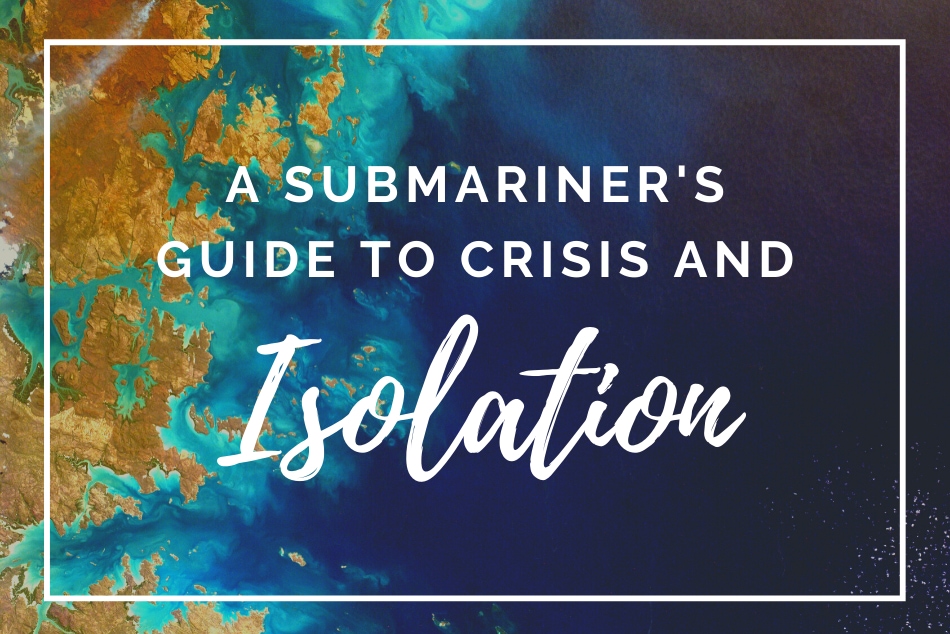A Submarine Officer’s Guide to Crisis & Isolation
With the possible exception of working on the International Space Station, deploying on a submarine hundreds of feet below the ocean is about as isolated as a person can get…and yet despite the physical isolation, submariners have learned to adapt to stay productive and avoid succumbing to feelings of desolation. Here are a few time-tested Submariner tips you can put to use in these challenging times:
1. Establish a new routine to create a new normal.
As soon as the submarine gets underway, the crew falls into a new and regimented watch standing routine, with a clear schedule and responsibilities. Nothing creates more daily stress and anxiety than living a life without routine and predictability. If COVID-19 has thrown a monkey wrench in your daily routine, then create a new one for yourself ASAP. A daily routine adds predictability and purpose to our lives, and it will immediately lower your default anxiety state.
2. When it’s chaos in the world outside, bring order to your house.
Submarine life involves regular cleaning and maintenance. Yes, this is important for health, hygiene, and equipment reliability, but it also has a profound psychological impact. You can’t control the craziness out there in the world being wreaked by COVID-19. You can’t impact the food supply at your local grocer, or the stock prices in the market. But what you can do is bring order and cleanliness to the confines of your house or apartment. You are king/queen of your domain. Take the time to organize, tidy-up, and get items crossed off your “to-do” list. It will reduce your anxiety and give you a sense of control.
3. Check the broadcast once a day, but otherwise, go deep and focus on your mission.
By design, a submarine stays out of sight and avoids communication with the outside world, focusing solely on completing its individual mission. This happens to be great advice for pandemics too. If you spend your whole day watching cable news and on social media, you’re going to become an emotional basket case. Cable news has one job, which is to create sensationalism. I’m not advocating being uninformed, but if you can limit your COVID-19 updates to once a day, your anxiety level will be lower and your productivity will be higher.
4. Have an “all hands on deck” mission planning session.
There’s an old adage in the military: Plan your work, then work your plan. Planning and execution are two of every submarine commanding officer’s favorite words and for good reason. Nothing on a submarine gets done without a plan. The better the plan, the better the probability of success. So, whether you’re a lone ranger or part of a family unit, have an “all hands on deck” meeting and start planning. Let everyone have a voice and contribute ideas.
Don’t let life be something that happens to you.
Develop a plan for cooking and freezing meals. Inventory your foodstuff and house supplies and figure out how long you can go between trips to the store. Plan for replenishing prescription medication at the same time as your shopping. Figure out who you can contact for help if you need money, or transportation, or medical advice… there are dozens of scenarios you could face in the coming weeks and months and you don’t have to have the answers to all of them. But if you have a plan—even if it’s not a perfect plan—you will be better prepared to deal with possible problems on the horizon. Don’t let life be something that “happens to you.” Tackle unpredictability with planning.
5. Practice Positive Self-Talk & Stop Being Your Own Harshest Critic
By default, most submariners tend to be hardworking overachievers because, well, becoming a nuclear engineer is generally not the preferred career path for slackers. But here’s the thing about Type-A overachievers, they also tend to be perfectionists who are super competitive and really hard on themselves. The same can be said for most authors I know. But a crisis is not the time to beat yourself up. A crisis is not the time for “would have, could have, should have.”
So stop nit-picking yourself, keep your chin up, and focus on your mission. That mission is to make it through these next six months with your health and sanity intact. If you’ve never used positive self-talk now is the time to start. It might feel a little awkward at first, but that’s okay—the world’s most successful athletes, performers, soldiers, and executives all do it. Start with gratitude statements. You won’t feel silly verbalizing them and they immediately reset your own personal ground zero. Here’s my favorite.
- “I’m grateful for the people in my life who love me.”
Then you can try simple affirmations. In a crisis, a daily pat on the back might just be the thing that gets you through the day.
- “I made a difference today because I did (thing) to help (person).”
- “When I could have given up, I chose to fight instead.”
- “I believe in me today. I believe in me tomorrow.”
This is a tough time for America. It’s a tough time for the world. But like the heroes in our favorite novels, we are rising to the challenge. With courage and community, we will get through this. And we will be stronger on the other side.
Let’s keep the conversation going on FACEBOOK.

